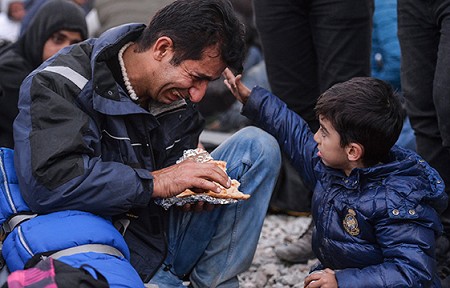The path to living mercifully
Hunger as a byproduct of war and conflict all too often helps to drive individuals and families out of their homelands and into unfamiliar, unfriendly territories where they rediscover themselves as homeless, lost refugees.
Jan 14, 2016

By David Gibson
Hunger as a byproduct of war and conflict all too often helps to drive individuals and families out of their homelands and into unfamiliar, unfriendly territories where they rediscover themselves as homeless, lost refugees.
Their struggle continues in this new environment. Will they be left to feel not only unwanted but degraded?
The physical hunger that gnaws away inside people is tragic. It screams for nourishment.
Other human hungers demand to be fed too, such as the hunger for an education that enables people to find their way in 21st century societies and generates a new sense of hope in life. People hunger for a secure home, good friends, an answer to heartfelt prayers and love.
How is mercy shown to people whose lives are dominated by a great hunger? This is a basic question of the church's current Year of Mercy.
I suspect that in the face of profound human hunger, Christians tend to feel not so much merciless as powerless. They wonder whether the little they can do will matter at all.
Merciful people do not have the solution for every large, painful problem they encounter. But this does not suggest that people intent on living mercifully should give up on that goal.
There is a path of mercy that Pope Francis encourages believers to follow. It is an essential path for Christians, he believes.
"The mercy of God is his loving concern for each one of us," the pope wrote in an April 2015 document called a "Bull of Indiction" proclaiming the Year of Mercy. God "feels responsible; that is, he desires our well-being, and he wants to see us happy, full of joy and peaceful," the pope said.
That, he stressed, "is the path that the merciful love of Christians must also travel. As the Father loves, so do his children. Just as he is merciful, so we are called to be merciful to each other."
Thus, the signposts along the path of mercy point in the direction of "loving concern" for others, a sense of responsibility for their situations and a desire for their well-being and happiness.
Perhaps this path of mercy represents a sort of starting point for living mercifully. Right from the start, however, it is clear that the call of mercy is demanding; its demands are not easily met.
If people of faith travel the path of mercy intent on assuaging the physical hunger that weakens bodies and shuts many millions off from the promise of the future, they are bound in a world like ours to encounter obstacles.
Physical hunger wreaks disastrous consequences. According to 2015 statistics from the World Food Program, 795 million people in the world do not have enough food to lead a healthy active life, and up to 3.1 million children die each year because of poor nutrition.
Naturally, malnutrition is hunger's companion. Malnutrition's wretched effects mean that some 17 million children "are born underweight annually, the result of inadequate nutrition before and during pregnancy," according to the World Food Program.
The World Food Program observes that "a hungry mind cannot concentrate, a hungry body does not take initiative, a hungry child loses all desire to play and study."
It concerns Pope Francis that our planet's citizens might grow acclimated to the hunger and poor nutrition that are the common lot of so many. In a January 2015 interview, he described two adjacent parts of Buenos Aires in his native Argentina, one where hunger was common, the other where food, to say the least, was abundant.
There was, he explained, a "new area called Puerto Madero, up to the train station, and then the start of the Villas Miserias, poor people, one after another. On one side there are 36 upscale restaurants. If you eat there, you pay dearly. Yet over there, there is hunger. One right next to the other. And we have a tendency of getting used to this."
Do people slide unwittingly into indifference when it comes to the truth about hunger? In his message for the 2016 World Day of Migrants and Refugees, Pope Francis warned that "indifference and silence lead to complicity whenever we stand by as people are dying of suffocation, starvation, violence."
Mercy calls for action. But surely any action I take today or tomorrow will be a mere drop in the ocean of human hunger. Do I care? Yes. Do I really know what I could or should do? Maybe not.
But mercy needs to begin somewhere. I could begin walking with others along the path of mercy that
Pope Francis describes in order to see where it leads. Isn't this what the Year of Mercy suggests
Consider something else Pope Francis said in his World Day of Migrants and Refugees message:
"Today, more than in the past, the Gospel of mercy troubles our consciences, prevents us from taking the suffering of others for granted and points out ways of responding which, grounded in the theological virtues of faith, hope and charity, find practical expression in works of spiritual and corporal mercy."







Total Comments:0